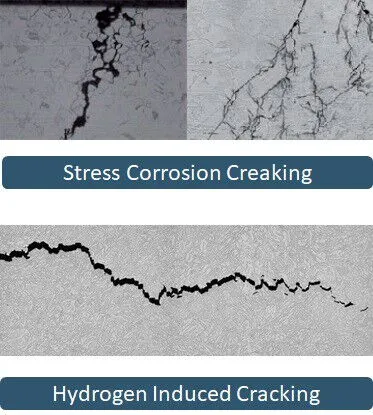What is Sour Service?
Sour Service refers to any process fluid that contains hydrogen sulfide. According to MR0175, it is a process atmosphere that contains H2S, which could cause the material to break.
In a refinery, sour service is often referred to as wet H2S service. I know you're wondering what makes it unique.
Alright! One extremely hazardous gas found in the oil and gas industry is H2S. Human health could be seriously impacted by even a little amount of exposure. It is combustible and colorless. The fragrance is really disagreeable.
It can produce acid rain if it seeps into the atmosphere and mixes with water.
It can be found in the LPG, hydro treater, crude oil, and wastewater facilities sections of refineries.
It will wait for its prey at the lower area because it is heavier than air.
In addition, its presence causes corrosion in metals through stepwise cracking, hydrogen-induced cracking, stress-oriented hydrogen-induced cracking, and sulfur-sulfur stress cracking.
In plants, this kind of material breaking results in catastrophic equipment failure.
Therefore, this H2S poses a risk to property, the environment, and people. For this reason, when it comes to sour service, extra care is needed.
What Materials are Used in Sour Services?
In sour service, stainless steel, alloy steel, and regular carbon steel are utilized. I've included a list of a few here for your reference.
However, before being installed, these materials must fulfill a few further standards.
Here are the additional requirements for carbon and low alloy steel.
- Steel shall be manufactured by Basic Oxygen Process or Electric arc furnace.
- Steel to be Killed & fine grained.
- Materials shall be in Normalized Condition.
- Nickel % limited to < 1%
- Carbon content< 0 .23%
- Carbon Equivalent < 0.43%
- Hardness < 22 HRC
- Sulphur content< 0.01%
Similar specifications for alloying elements and heat treatment with a maximum hardness limit apply to stainless steel material.
Let's now examine what more testing are necessary for these materials.
Which other tests are necessary for materials used in sour services?
- HIC – Hydrogen Induced Cracking
- SSC – Sulphide stress cracking,
- SOHIC – Stress oriented hydrogen induced cracking
Additionally, all carbon and low alloy steel materials used in sour service must have PWHT after welding.
NACE MR0175 contains the testing and acceptance criteria requirements. So, if you're interested in learning more, read it.
Also, note that NACE MR0175 is the same as ISO 15156.
What is NACE?
The National Association of Corrosion Engineers International is NACE in its entirety. The Association for Materials Protection and Performance, or AMPP, is the new name for it. This organization released a number of corrosion testing guidelines that are frequently applied in the oil and gas industry.
When process fluids are corrosive, the pipe's material should be chosen such that it can survive the environment for the duration of its life. To demonstrate their capabilities, these metals must be put through testing in such a harsh environment.
NACE standards are utilized to test the pipes used in hydrogen-induced cracking and sulfur stress cracking. For these services, the most popular standards are NACE MR0175 and NACE MR0103 respectively.

